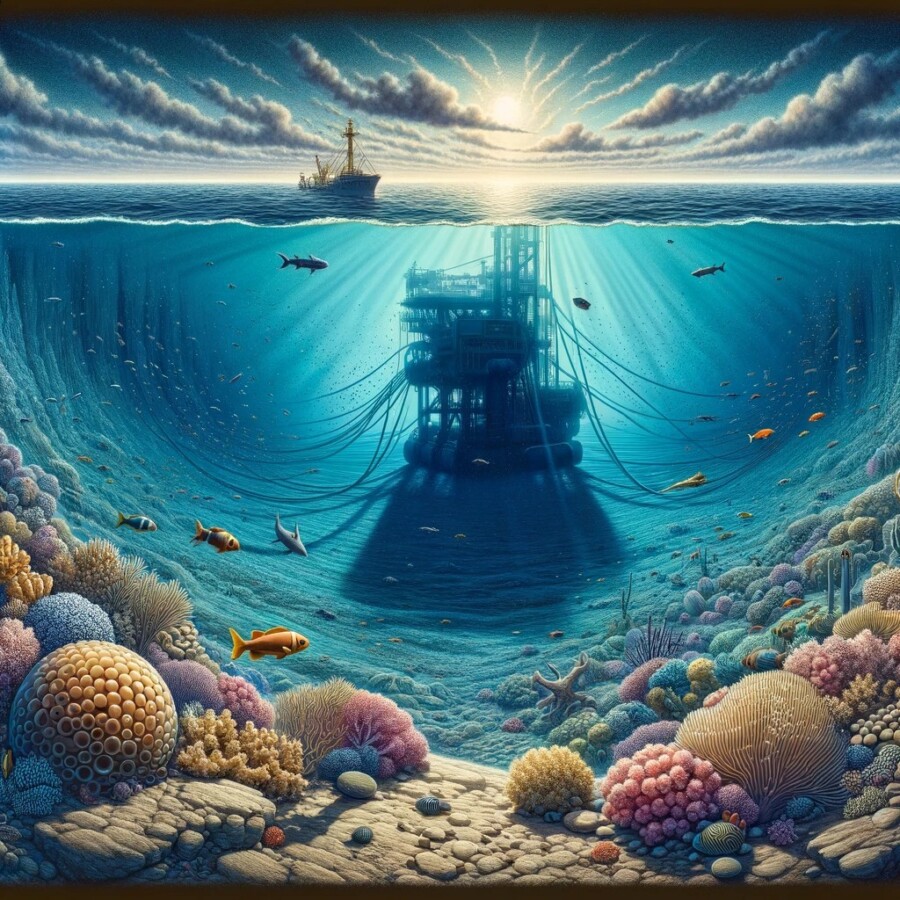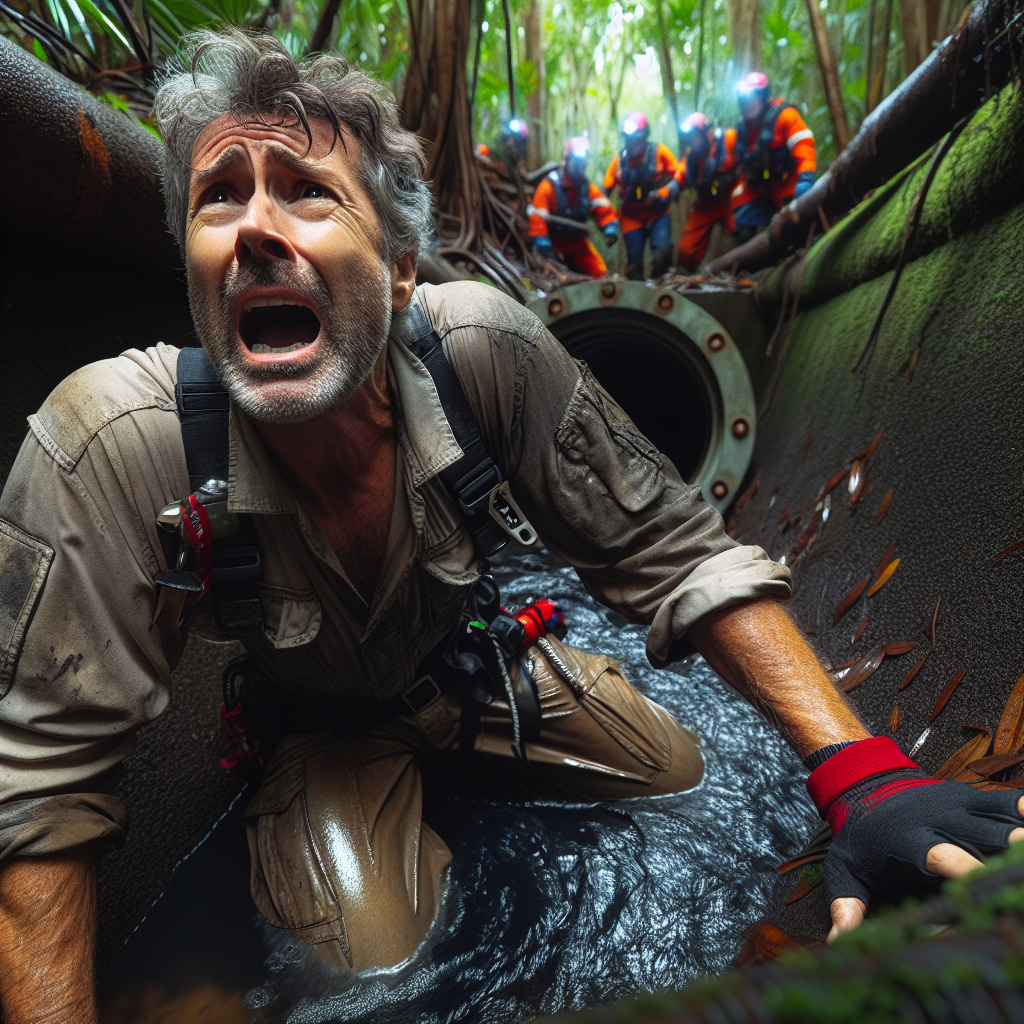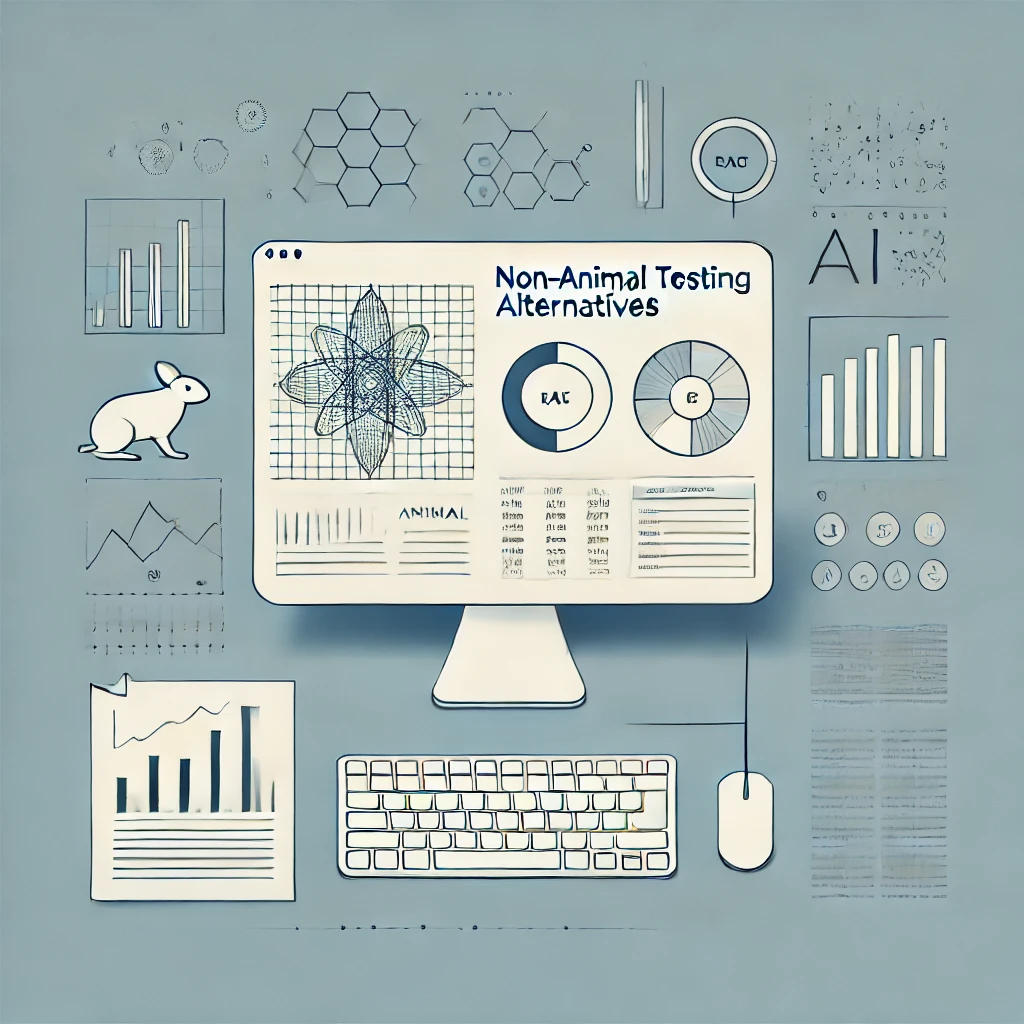Seabed mining, the extraction of minerals from the ocean floor, is a topic of debate. Some argue that it is an economic necessity, while others see it as a hazard to the environment. The Metals Company, a deep-sea mining firm, claims that its extraction method has minimal impact on the environment. They use remote-controlled machines to scoop up rocks from the seabed, which are then processed to extract minerals like cobalt, nickel, copper, and manganese. The company hopes to start commercial mining in international waters by the end of 2025, pending authorization from the International Seabed Authority (ISA).
However, there are concerns about the environmental impact of seabed mining. Many countries, including the UK, Brazil, Canada, France, and Germany, want to continue the ban on commercial extraction due to these concerns. The World Wide Fund for Nature (WWF) opposes all deep-sea mining, citing the potential destruction of habitats and species. The European Academies Science Advisory Council (EASAC) also questions the need for deep-sea mining, as some of the minerals produced are not considered to be at supply risk.
The area of the north Pacific that The Metals Company wants to mine is called the Clarion-Clipperton Zone, which is a vast section of ocean between Hawaii and Mexico. The company argues that mining in this zone would cause less environmental disturbance than land-based mining, such as nickel extraction in Indonesia and the Philippines. They claim that the abyssal zone where the rocks are located has minimal flora and fauna compared to other mining areas.
Critics argue that investing in the processing of existing mining waste and increasing recycling efforts could reduce the demand for new mineral mining sites. They also suggest that research into alternative technologies may decrease the future demand for key minerals. Norway’s Loke Minerals, another company interested in deep-sea mining, acknowledges the need for further study on the environmental impact.
The decision on whether to allow commercial deep-sea mining lies with the ISA. The organization faces the challenge of balancing the potential economic benefits with the environmental risks. Strong environmental regulations are necessary to mitigate these risks. Ultimately, the outcome of this debate will shape the future of deep-sea mining and its impact on the environment.
Original news source: Is seabed mining an economic necessity or a hazard? (BBC)
🎧 Listen:
Slow
Normal
Fast
📖 Vocabulary:
| 1 | extraction | The act of removing or obtaining something from a source |
| 2 | hazard | A danger or risk |
| 3 | minimal | Very small in amount or degree |
| 4 | remote-controlled | Operated from a distance, especially by using radio or electronic signals |
| 5 | scoop | To gather or lift with a movement that resembles using a shovel |
| 6 | authorization | Official permission or approval for an action |
| 7 | habitats | Natural environments in which organisms live |
| 8 | species | A group of living organisms that are of the same kind and can interbreed |
| 9 | vast | Extremely large or extensive |
| 10 | disturbance | An interruption or a state of being upset |
| 11 | abyssal | Pertaining to the deepest parts of the ocean |
| 12 | flora | The plants of a particular region or period |
| 13 | fauna | The animals of a particular region, habitat, or geological period |
| 14 | recycling | The process of converting waste materials into reusable material |
| 15 | mitigate | To make less severe, serious, or painful |
Group or Classroom Activities
Warm-up Activities:
– News Summary
Instructions: In pairs or small groups, have students read the article and then summarize the main points in their own words. They should focus on the arguments for and against seabed mining, as well as the potential environmental impact. After summarizing, have students share their summaries with the class.
– Opinion Poll
Instructions: Divide the class into two groups: one in favor of seabed mining and one against. Have students brainstorm reasons to support their position and then conduct an opinion poll within their group. Each student should ask at least three classmates for their opinion and record their responses. After gathering the data, have students share their findings with the class and discuss the results.
– Sketch It
Instructions: Provide each student with a piece of paper and a pen or pencil. Instruct them to read the article and choose one aspect of seabed mining that they find interesting or controversial. Then, have students sketch a visual representation of their chosen aspect. After everyone has finished, ask volunteers to share their sketches with the class and explain their choices.
– Vocabulary Pictionary
Instructions: Create a list of key vocabulary words from the article related to seabed mining and its environmental impact. Divide the class into pairs or small groups and give each group a set of vocabulary words. One student from each group should draw a picture representing one of the words, while the other group members try to guess what it is. After a set amount of time, rotate roles so that each student has a chance to draw and guess.
– Pros and Cons
Instructions: Divide the class into small groups and assign each group either the “pros” or “cons” of seabed mining. In their groups, students should brainstorm as many points as possible to support their assigned position. After a few minutes, have groups come together and take turns sharing one point at a time. Encourage respectful discussion and debate among students as they weigh the advantages and disadvantages of seabed mining.
🤔 Comprehension Questions:
1. What is the extraction method used by The Metals Company for seabed mining?
2. Which countries are in favor of continuing the ban on commercial extraction of seabed mining?
3. What are the concerns raised by the World Wide Fund for Nature (WWF) regarding deep-sea mining?
4. What is the Clarion-Clipperton Zone and why does The Metals Company want to mine there?
5. How do critics suggest reducing the demand for new mineral mining sites?
6. What is the stance of Norway’s Loke Minerals on deep-sea mining?
7. Who has the authority to decide whether to allow commercial deep-sea mining?
8. What factors does the International Seabed Authority (ISA) need to consider when making their decision?
Go to answers ⇩
🎧✍️ Listen and Fill in the Gaps:
Seabed (1)______, the extraction of minerals from the ocean (2)______, is a topic of debate. Some argue that it is an (3)______ necessity, while others see it as a hazard to the environment. The Metals Company, a deep-sea mining firm, claims that its extraction method has minimal impact on the environment. They use remote-controlled machines to scoop up (4)______ from the seabed, which are then processed to extract minerals like cobalt, nickel, copper, and manganese. The company hopes to start commercial mining in international waters by the end of 2025, pending authorization from the International Seabed Authority (ISA).
However, there are concerns about the environmental impact of seabed mining. Many countries, including the UK, Brazil, Canada, France, and Germany, want to continue the ban on commercial extraction due to these concerns. The World Wide Fund for Nature (WWF) opposes all deep-sea mining, citing the potential (5)______ of (6)______ and (7)______. The European Academies Science Advisory Council (EASAC) also questions the need for deep-sea mining, as some of the minerals produced are not considered to be at supply risk.
The area of the north Pacific that The Metals (8)______ wants to mine is called the Clarion-Clipperton Zone, which is a vast section of ocean between Hawaii and Mexico. The company argues that mining in this zone would cause less environmental disturbance than land-based mining, such as nickel extraction in Indonesia and the (9)______. They claim that the abyssal zone where the rocks are located has minimal flora and fauna compared to other mining areas.
Critics argue that (10)______ in the processing of existing mining waste and increasing recycling efforts could reduce the demand for new mineral mining sites. They also (11)______ that (12)______ into alternative (13)______ may decrease the future demand for key minerals. Norway’s Loke Minerals, another company interested in deep-sea mining, (14)______ the need for further study on the environmental impact.
The decision on whether to allow commercial deep-sea mining lies with the ISA. The organization faces the challenge of balancing the potential economic benefits with the environmental (15)______. (16)______ environmental regulations are necessary to mitigate these risks. Ultimately, the outcome of this debate will shape the future of deep-sea mining and its impact on the environment.
Go to answers ⇩
💬 Discussion Questions:
Students can ask a partner these questions, or discuss them as a group.
1. What is seabed mining and why is it a topic of debate?
2. How would you feel if seabed mining was allowed to take place in international waters?
3. Do you think seabed mining is an economic necessity? Why or why not?
4. What is your opinion on the claim that seabed mining has minimal impact on the environment?
5. Do you think the ban on commercial extraction of minerals from the ocean floor should continue? Why or why not?
6. How do you think deep-sea mining could potentially destroy habitats and species?
7. What are your thoughts on the argument that investing in recycling efforts and processing existing mining waste could reduce the need for new mineral mining sites?
8. Do you believe that research into alternative technologies could decrease the future demand for key minerals? Why or why not?
9. What do you think about the idea that deep-sea mining in the Clarion-Clipperton Zone would cause less environmental disturbance than land-based mining?
10. How do you think strong environmental regulations can help mitigate the risks of deep-sea mining?
11. What is your opinion on the potential economic benefits of deep-sea mining compared to the environmental risks?
12. How would you feel if the International Seabed Authority allowed commercial deep-sea mining to proceed?
13. Do you think the future of deep-sea mining should be shaped by this debate? Why or why not?
14. What are your thoughts on the need for further study on the environmental impact of deep-sea mining?
15. How do you think the decision on commercial deep-sea mining will impact the environment in the long term?
Individual Activities
📖💭 Vocabulary Meanings:
Match each word to its meaning.
Words:
1. extraction
2. hazard
3. minimal
4. remote-controlled
5. scoop
6. authorization
7. habitats
8. species
9. vast
10. disturbance
11. abyssal
12. flora
13. fauna
14. recycling
15. mitigate
Meanings:
(A) Operated from a distance, especially by using radio or electronic signals
(B) Very small in amount or degree
(C) Extremely large or extensive
(D) To gather or lift with a movement that resembles using a shovel
(E) Natural environments in which organisms live
(F) An interruption or a state of being upset
(G) To make less severe, serious, or painful
(H) A group of living organisms that are of the same kind and can interbreed
(I) Pertaining to the deepest parts of the ocean
(J) The animals of a particular region, habitat, or geological period
(K) Official permission or approval for an action
(L) The act of removing or obtaining something from a source
(M) The plants of a particular region or period
(N) The process of converting waste materials into reusable material
(O) A danger or risk
Go to answers ⇩
🔡 Multiple Choice Questions:
1. What is the main argument made by The Metals Company in favor of seabed mining?
(a) Seabed mining is an economic necessity.
(b) Seabed mining is less environmentally damaging than land-based mining.
(c) Their extraction method has minimal impact on the environment.
(d) The Clarion-Clipperton Zone has minimal flora and fauna.
2. Which organization opposes all deep-sea mining?
(a) The World Wide Fund for Nature (WWF)
(b) The European Academies Science Advisory Council (EASAC)
(c) The International Seabed Authority (ISA)
(d) The Metals Company
3. What is the name of the area in the north Pacific that The Metals Company wants to mine?
(a) The Clarion-Clipperton Zone
(b) Hawaii
(c) Mexico
(d) The abyssal zone
4. What do critics of seabed mining suggest as an alternative?
(a) Allowing commercial extraction in international waters.
(b) Investing in the processing of existing mining waste and increasing recycling efforts.
(c) Continuing the ban on commercial extraction.
(d) Researching alternative technologies.
5. Who has the authority to decide on allowing commercial deep-sea mining?
(a) The Metals Company
(b) The World Wide Fund for Nature (WWF)
(c) The International Seabed Authority (ISA)
(d) The European Academies Science Advisory Council (EASAC)
6. What is the main concern of countries like the UK, Brazil, Canada, France, and Germany regarding seabed mining?
(a) The economic benefits of seabed mining.
(b) The need for deep-sea mining.
(c) The environmental impact of land-based mining.
(d) The potential destruction of habitats and species.
7. What is the main challenge faced by the International Seabed Authority (ISA) in deciding on commercial deep-sea mining?
(a) Authorizing The Metals Company to start commercial mining.
(b) Balancing the potential economic benefits with the environmental risks.
(c) Mitigating the risks of deep-sea mining.
(d) Allowing seabed mining in international waters.
8. What will ultimately shape the future of deep-sea mining and its impact on the environment?
(a) The extraction method used by The Metals Company.
(b) The environmental regulations put in place by the ISA.
(c) The demand for key minerals in the future.
(d) The outcome of the debate and decision made by the ISA.
Go to answers ⇩
🕵️ True or False Questions:
1. The Metals Company claims that its extraction method for seabed mining has significant impact on the environment.
2. The company uses manually-operated machines to scoop up rocks from the seabed and extract minerals like cobalt, nickel, copper, and manganese.
3. The World Wide Fund for Nature (WWF) supports all deep-sea mining, citing potential preservation of habitats and species.
4. Many countries, including the UK, Brazil, Canada, France, and Germany, want to continue the ban on commercial seabed mining due to concerns about its environmental impact.
5. The company hopes to start commercial mining in international waters by the end of 2025, pending authorization from the International Seabed Authority (ISA).
6. The decision on whether to allow commercial deep-sea mining lies with the International Seabed Authority (ISA), which must prioritize the potential economic benefits over the environmental risks.
7. Seabed mining is a topic of debate, with some arguing it is an economic necessity and others seeing it as an environmental hazard.
8. The European Academies Science Advisory Council (EASAC) questions the need for deep-sea mining, as some of the minerals produced are not considered to be at supply risk.
Go to answers ⇩
📝 Write a Summary:
Write a summary of this news article in two sentences.
Check your writing now with the best free AI for English writing!
Writing Questions:
Answer the following questions. Write as much as you can for each answer.
Check your answers with our free English writing assistant!
1. What is the extraction method used by The Metals Company for seabed mining?
2. Which countries want to continue the ban on commercial extraction of minerals from the ocean floor?
3. What are the concerns raised by the World Wide Fund for Nature (WWF) regarding deep-sea mining?
4. Where is the Clarion-Clipperton Zone located and why does The Metals Company argue that mining in this zone would cause less environmental disturbance?
5. What alternatives do critics suggest to reduce the demand for new mineral mining sites and decrease the future demand for key minerals?
✅ Answers
🤔✅ Comprehension Question Answers:
1. What is the extraction method used by The Metals Company for seabed mining?
The Metals Company uses remote-controlled machines to scoop up rocks from the seabed.
2. Which countries are in favor of continuing the ban on commercial extraction of seabed mining?
The countries in favor of continuing the ban on commercial extraction of seabed mining include the UK, Brazil, Canada, France, and Germany.
3. What are the concerns raised by the World Wide Fund for Nature (WWF) regarding deep-sea mining?
The concerns raised by the WWF regarding deep-sea mining include the potential destruction of habitats and species.
4. What is the Clarion-Clipperton Zone and why does The Metals Company want to mine there?
The Clarion-Clipperton Zone is a vast section of ocean between Hawaii and Mexico. The Metals Company wants to mine there because they argue that it would cause less environmental disturbance compared to land-based mining.
5. How do critics suggest reducing the demand for new mineral mining sites?
Critics suggest reducing the demand for new mineral mining sites by investing in the processing of existing mining waste and increasing recycling efforts. They also suggest researching alternative technologies that may decrease the future demand for key minerals.
6. What is the stance of Norway’s Loke Minerals on deep-sea mining?
Norway’s Loke Minerals acknowledges the need for further study on the environmental impact of deep-sea mining.
7. Who has the authority to decide whether to allow commercial deep-sea mining?
The International Seabed Authority (ISA) has the authority to decide whether to allow commercial deep-sea mining.
8. What factors does the International Seabed Authority (ISA) need to consider when making their decision?
The International Seabed Authority (ISA) needs to consider the potential economic benefits of deep-sea mining as well as the environmental risks associated with it. They need to balance these factors and ensure strong environmental regulations are in place to mitigate the risks.
Go back to questions ⇧
🎧✍️✅ Listen and Fill in the Gaps Answers:
(1) mining
(2) floor
(3) economic
(4) rocks
(5) destruction
(6) habitats
(7) species
(8) Company
(9) Philippines
(10) investing
(11) suggest
(12) research
(13) technologies
(14) acknowledges
(15) risks
(16) Strong
Go back to questions ⇧
📖💭✅ Vocabulary Meanings Answers:
1. extraction
Answer: (L) The act of removing or obtaining something from a source
2. hazard
Answer: (O) A danger or risk
3. minimal
Answer: (B) Very small in amount or degree
4. remote-controlled
Answer: (A) Operated from a distance, especially by using radio or electronic signals
5. scoop
Answer: (D) To gather or lift with a movement that resembles using a shovel
6. authorization
Answer: (K) Official permission or approval for an action
7. habitats
Answer: (E) Natural environments in which organisms live
8. species
Answer: (H) A group of living organisms that are of the same kind and can interbreed
9. vast
Answer: (C) Extremely large or extensive
10. disturbance
Answer: (F) An interruption or a state of being upset
11. abyssal
Answer: (I) Pertaining to the deepest parts of the ocean
12. flora
Answer: (M) The plants of a particular region or period
13. fauna
Answer: (J) The animals of a particular region, habitat, or geological period
14. recycling
Answer: (N) The process of converting waste materials into reusable material
15. mitigate
Answer: (G) To make less severe, serious, or painful
Go back to questions ⇧
🔡✅ Multiple Choice Answers:
1. What is the main argument made by The Metals Company in favor of seabed mining?
Answer: (c) Their extraction method has minimal impact on the environment.
2. Which organization opposes all deep-sea mining?
Answer: (a) The World Wide Fund for Nature (WWF)
3. What is the name of the area in the north Pacific that The Metals Company wants to mine?
Answer: (a) The Clarion-Clipperton Zone
4. What do critics of seabed mining suggest as an alternative?
Answer: (b) Investing in the processing of existing mining waste and increasing recycling efforts.
5. Who has the authority to decide on allowing commercial deep-sea mining?
Answer: (c) The International Seabed Authority (ISA)
6. What is the main concern of countries like the UK, Brazil, Canada, France, and Germany regarding seabed mining?
Answer: (d) The potential destruction of habitats and species.
7. What is the main challenge faced by the International Seabed Authority (ISA) in deciding on commercial deep-sea mining?
Answer: (b) Balancing the potential economic benefits with the environmental risks.
8. What will ultimately shape the future of deep-sea mining and its impact on the environment?
Answer: (d) The outcome of the debate and decision made by the ISA.
Go back to questions ⇧
🕵️✅ True or False Answers:
1. The Metals Company claims that its extraction method for seabed mining has significant impact on the environment. (Answer: False)
2. The company uses manually-operated machines to scoop up rocks from the seabed and extract minerals like cobalt, nickel, copper, and manganese. (Answer: False)
3. The World Wide Fund for Nature (WWF) supports all deep-sea mining, citing potential preservation of habitats and species. (Answer: False)
4. Many countries, including the UK, Brazil, Canada, France, and Germany, want to continue the ban on commercial seabed mining due to concerns about its environmental impact. (Answer: True)
5. The company hopes to start commercial mining in international waters by the end of 2025, pending authorization from the International Seabed Authority (ISA). (Answer: True)
6. The decision on whether to allow commercial deep-sea mining lies with the International Seabed Authority (ISA), which must prioritize the potential economic benefits over the environmental risks. (Answer: False)
7. Seabed mining is a topic of debate, with some arguing it is an economic necessity and others seeing it as an environmental hazard. (Answer: True)
8. The European Academies Science Advisory Council (EASAC) questions the need for deep-sea mining, as some of the minerals produced are not considered to be at supply risk. (Answer: True)
Go back to questions ⇧















